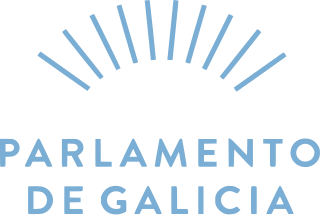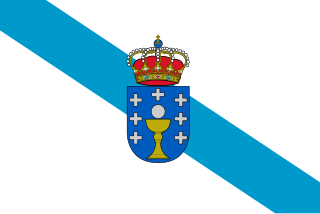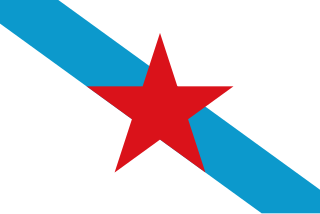
Galicia is an autonomous community of Spain and historic nationality under Spanish law. Located in the northwest Iberian Peninsula, it includes the provinces of A Coruña, Lugo, Ourense, and Pontevedra.

Santiago de Compostela, simply Santiago, or Compostela, is the capital of the autonomous community of Galicia, in northwestern Spain. The city has its origin in the shrine of Saint James the Great, now the Cathedral of Santiago de Compostela, as the destination of the Way of St. James, a leading Catholic pilgrimage route since the 9th century. In 1985, the city's Old Town was designated a UNESCO World Heritage Site.

James the Great was one of the Twelve Apostles of Jesus. According to the New Testament, he was the second of the apostles to die, and the first to be martyred. Saint James is the patron saint of Spain and, according to tradition, his remains are held in Santiago de Compostela in Galicia.

Pontevedra is a city in the autonomous community of Galicia, in northwestern Spain. It is the capital of both the Comarca and Province of Pontevedra, and the capital of the Rías Baixas. It is also the capital of its own municipality which is often considered an extension of the actual city.

Vigo is a city and municipality in the province of Pontevedra, within the autonomous community of Galicia, Spain. Located in the northwest of the Iberian Peninsula, it sits on the southern shore of an inlet of the Atlantic Ocean, the Ria de Vigo, the southernmost of the Rías Baixas. It is the capital of the comarca of Vigo.

A Coruña is a city and municipality in Galicia, Spain. It is Galicia's second largest city, behind Vigo. The city is the provincial capital of the province of A Coruña, having also served as political capital of the Kingdom of Galicia from the 16th to the 19th centuries, and as a regional administrative centre between 1833 and 1982.

The Socialists' Party of Galicia is a centre-left political party in Galicia, Spain. It is the Galician affiliate of the Spanish Socialist Workers' Party (PSOE). It defines itself as a Galicianist, social-democratic party.
The Xunta de Galicia is the collective decision-making body of the government of the autonomous community of Galicia, composed of the President, the Vice-President(s) and the specialized ministers (Conselleiros).

The Parliament of Galicia is the unicameral legislature of the autonomous community of Galicia, Spain. It is formed by 75 deputies. Deputies are elected every four years in ordinary period, or extraordinarily upon dissolution and call of elections by the President of the Xunta of Galicia, by universal suffrage in proportional lists with the four Galician provinces serving as constituencies.

A parroquia is a population entity or parish found in the autonomous communities of Galicia and Asturias in northwestern Spain. They are entities with a territorial scope lower than municipality and have their own legal personality. They usually, but not always, coincide with the ecclesiastic divisions, as they originated on par with them.
La Voz de Galicia is a Spanish daily newspaper owned by the Corporación Voz de Galicia. La Voz is highest circulation newspaper in Galicia and the eighth-highest circulation general-interest daily newspaper in Spain. It is written primarily in Spanish with Galician used in the cultural and opinion sections.

The Galicia national football team is the official football team of Galicia. It is organised by the Galician Football Federation. The team is not affiliated with FIFA or UEFA and is, therefore, only allowed to play friendly matches.

Galician nationalism is a form of nationalism found mostly in Galicia, which asserts that Galicians are a nation and that promotes the cultural unity of Galicians. The political movement referred to as modern Galician nationalism was born at the beginning of the twentieth century from the idea of Galicianism.
The Divisiones Regionales de Fútbol in the Community of Galicia, are organized by Federación Gallega de Fútbol :

Galician, also known as Galego, is a Western Ibero-Romance language. Around 2.4 million people have at least some degree of competence in the language, mainly in Galicia, an autonomous community located in northwestern Spain, where it has official status along with Spanish. The language is also spoken in some border zones of the neighbouring Spanish regions of Asturias and Castile and León, as well as by Galician migrant communities in the rest of Spain, in Latin America including Puerto Rico, the United States, Switzerland and elsewhere in Europe.
Galician Americans are Americans of Galician descent.
The Perdigueiro Galego is a rare breed of pointer from the autonomous community of Galicia in north-western Spain. It is one of four traditional breeds of the region, the others being the Can de Palleiro, the Guicho or Quisquelo, and the Podengo Galego.

The 2024 Galician regional election was held on Sunday, 18 February 2024, to elect the 12th Parliament of the Autonomous Community of Galicia. All 75 seats in the Parliament were up for election.

Galicia irredenta or Galicia estremeira, also spelled as Galiza irredenta and Galiza estremeira and also known as Faixa Leste or Franxa Leste, is a term used for all Galician-speaking territories located outside of Galicia. These are all located in Spain, in either Asturias or Castile and León. These territories are sometimes divided into three subregions: El Bierzo, Eo-Navia and As Portelas.
















